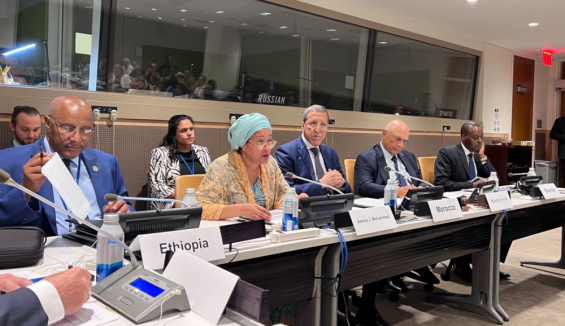The Moroccan Mission to the United Nations in New York and the OCP Group jointly organized a high-level event on food security in Africa. This event was held as part of the UN Economic and Social Council (ECOSOC) High-Level Political Forum on Sustainable Development, taking place in New York City from July 8 to 17.
The meeting had the co-sponsorship of Rwanda, Ethiopia, Nigeria, and Kenya. The event opened with introductory remarks by UN Under-Secretary-General Amina Mohammed and Morocco's Ambassador to the UN, Omar Hilale. OCP Group Chairman and CEO Mostafa Terrab also delivered a presentation.
In his opening statement, Ambassador Hilale stressed Morocco's commitment to fighting hunger and promoting sustainable agriculture. He highlighted the global challenge of food security, with a particular focus on Africa.
The diplomat pointed out Morocco's long-standing investment in agriculture, particularly through South-South cooperation efforts in Africa. Africa holds more than half of the world's uncultivated arable land, and Morocco is committed to sharing its experience and best practices with sister African countries.
This approach aligns with the recommendations of the 2021 UN Food Systems Summit, which called for stronger partnerships and encouraging public and private investment to unlock the full potential of sustainable agriculture, Ambassador Hilale continued.
Chairman and CEO of the OCP Group, Mostafa Terrab, also addressed the audience. He noted that despite a shrinking global average of arable land per capita, Africa holds 60% of the world's uncultivated arable land. Terrab emphasized the need to change perceptions regarding Africa's role in food security.
Terrab explained that food security relies heavily on soil and plant nutrition. «Without fertilizers, we will only be able to produce half the food we produce today», he said.
Terrab questioned why Africa doesn't make enough use of fertilizers, considering the continent is the biggest exporter of raw materials used in fertilizer production. He pointed out the paradox: Africa is a «net importer» of finished fertilizers despite having the resources to produce them.
Terrab explained how this situation changed when the OCP Group deployed its multidimensional strategy and decided to produce fertilizers in Africa, allocating a significant portion to African countries. Today, 65% of the fertilizers used in Africa are manufactured on the continent.
He also spoke of the Group's growth since it began investing heavily in fertilizer production, achieving a global market share of over 30%. This performance has enabled the Group to become the world's leading fertilizer producer, with a capacity of 15 million tonnes and a significant share of the finished fertilizer market worldwide.
Terrab outlined key actions for Africa to ensure food security: producing its own fertilizers, using appropriate fertilizers to boost productivity, contributing to achieving Sustainable Development Goal (SDG) 13 on climate action, and making soil health and nutrition affordable for small-scale farmers.
Speaking at the event, the UN Under-Secretary-General praised Morocco's investments in developing the agricultural sector through promoting local production and establishing policy frameworks that catalyze the development of sustainable and resilient food systems.
She noted that this approach has created jobs and strengthened the role of women in Moroccan society. She emphasized that sustainable food systems «concern not only those who consume but also those who manage and harvest, from production to the table».
The UN official also highlighted Africa's enormous potential, accounting for 60% of the planet's uncultivated arable land. She stressed the importance of leveraging partnerships to realize the continent's vision enshrined in Africa's Agenda 2063, calling for the promise to be kept not just for the SDGs and their acceleration, but for the Africa Africans want.
Until July 17, the High-Level Forum on Sustainable Development will review progress towards Goal 1 on poverty eradication, Goal 2 on zero hunger, Goal 13 on climate action, Goal 16 on peaceful and inclusive societies, and Goal 17 on strengthening the means of implementation.





 chargement...
chargement...













